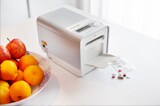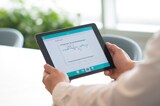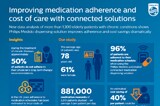Connected technology solutions dramatically improve medication adherence, according to new study from Philips
June 1, 2016
Amsterdam, the Netherlands – Royal Philips (NYSE: PHG; AEX: PHIA) today announced new study results demonstrating the use of a connected medication dispensing technology can greatly benefit patients with chronic conditions, helping them better comply with long-term therapy. Over the span of one year, user data from more than 1,300 patients in the Netherlands was analyzed, showing 96% of patients using Philips Medido, a connected medication dispensing solution, were adherent to their medication schedule. Data from the study also showed that patients using Medido stayed adherent to long-term therapy over time, showing little or no change in adherence over the course of the year. Successful treatment with prescription medication requires consistent use over time. Studies have shown that during the treatment of chronic illnesses approximately 50% of patients do not adhere to their physician’s long-term therapy recommendations1,2. While patients rely on their medications to keep them healthy and help them manage chronic conditions, complex medication schedules can often lead to mistakes, such as missed doses, incorrect amounts, or taking medications at the wrong time. Through a connected medication dispensing solution like Medido, patients living with chronic conditions can better manage their medication schedules, resulting in higher medication adherence and reduced costs of care. “Proper medication adherence is such a crucial part to managing a chronic illness, and yet the more complicated a patient’s care plan, the harder it can be to keep track of pills, doses, and the times they need to take their medication,” said Kimberly O’Loughlin, Senior Vice President and General Manager of Home Monitoring, Philips. “By providing patients and caregivers with a solution that simplifies this part of the care process, they’re able to feel more independent and secure in their care, and feel more confident aging in the comfort of their own homes.” The study looked into 881,000 medication moments of 1,379 patients in the Netherlands who on average took three doses per day. Key data and findings from the study include: Philips Medido is an innovative home medication dispensing service designed to support chronically ill patients and care providers. When the patient’s scheduled medication time arrives, the dispenser automatically reminds them, ensures that the correct medication is being released at the correct time and then releases and opens individual pouches according to the patient’s prescribed regimen. The solution monitors removing medication from the dispenser and remotely alerts nursing staff when medication is not taken from the device, helping to streamline the normally time-consuming task of medication management and allowing them to focus on additional care issues. Medido is currently available in the Netherlands, with additional launches expected in the U.S. and Europe later this year. For more than 40 years, Philips has been a leader in connected home health solutions with its Lifeline business, helping seniors live more safely and independently. Last year, Philips launched CareSage, a predictive analytics engine that helps care providers remotely manage at-risk patients and predicts whether a patient will need emergency transport in the next 30 days. Philips will also be showcasing its latest connected health software, solutions and services at eHealth Week 2016 in Amsterdam. For more information on Philips presence at eHealthWeek, please visit: www.philips.nl/ehealthweek. 1 Sabaté E, et al. Adherence to Long-Term Therapies: Evidence for Action. Geneva, Switzerland: World Health Organization 2003. 2 Brown MT, Bussell JK. Medication adherence: WHO cares? Mayo Clinic Proceedings 2011; 86 (4): 304-314. 3 Based on calculations for a patient receiving two combined-care visits and one medication-assistance-only visit a day in the Dutch context. This calculation was not part of the adherence data study. More info can be found in the white paper “Medido, a smart medication dispensing solution, shows high rates of medication adherence and potential to reduce cost of care” http://tinyurl.com/hprpocy More info can be found in the white paper “Medido, a smart medication dispensing solution, shows high rates of medication adherence and potential to reduce cost of care”.
In addition to improving medication adherence, connected technology solutions can have a significant economic impact. Earlier study findings conclude that an estimated costs saving of up to 40% per patient could be achieved for specific groups of patients when connected dispensing solutions are part of the patient’s regimen3.




For further information, please contact:
Kathy O’Reilly Philips Group Communications (o) 978-659-2638 (mobile) 978-221-8919 Twitter: @kathyoreilly Joost Maltha Philips Communications Healthcare Informatics, Solutions and Services Tel. +31 6 10 55 8116 E-mail: joost.maltha@philips.com Twitter: @joostmaltha
About Royal Philips Royal Philips (NYSE: PHG, AEX: PHIA) is a leading health technology company focused on improving people's health and enabling better outcomes across the health continuum from healthy living and prevention, to diagnosis, treatment and home care. Philips leverages advanced technology and deep clinical and consumer insights to deliver integrated solutions. The company is a leader in diagnostic imaging, image-guided therapy, patient monitoring and health informatics, as well as in consumer health and home care. Headquartered in the Netherlands, Philips' health technology portfolio generated 2015 sales of EUR 16.8 billion and employs approximately 69,000 employees with sales and services in more than 100 countries. News about Philips can be found at www.philips.com/newscenter.
